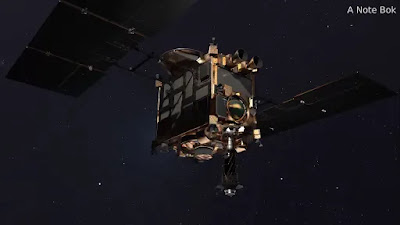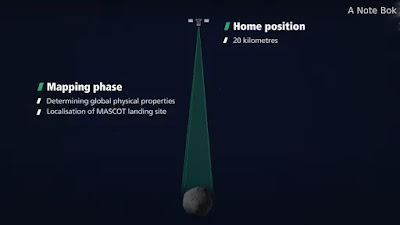First Time ever in the World Spacecraft Collected Samples from Asteroid Ryugu!

Brief:
Japanese Hayabusa 2 collected Samples from Asteroid ‘Ryugu’ and returned back to Earth for analysis.
What are Asteroids?
Definition: Asteroids are actually minor planets which can neither be classified either as a planet or as a comet. These are generally in the direct orbit around the Sun, also known as the inner solar system. The larger forms of asteroids are also known as planetoids.
Before 6 years ago on 3rd
December 2014 Japan launched a mission ‘Hayabusa 2’.
Its objective is to collect samples
from Asteroid ‘Ryugu’ and bring them to Earth for analysis.
Hayabusa 2 spacecraft arrived at the Ryugu Asteroid in June 2018. Spacecraft deployed 2 rovers and a small lander on the surface of the Asteroid. Hayabusa 2 fired an impactor on asteroid on February 2019 to create an artificial crater (To allow Hayabusa 2 to collect sample from surface). Hayabusa 2 delivered the asteroid sample to Earth on 6th December 2020.
In Depth:
Launch Date: 3rd December 2014.
Launch Site: Tanegashima Space Center, Tanegashima, Japan.
Destination: Asteroid.
Type: Orbiter, Sample
Return, Lander, Rover.
Status: Extended Mission in
Progress.
Nation: Japan
Alternate Names: 2014-076A,
40319
Spacecraft Mass: 1,323 pounds (600 kilograms)
Management and
Design of Mission: Japan Aerospace
Exploration Agency (JAXA).
Instruments:
Near infrared spectrometer (NIRS3)
Thermal infrared imager (TIR)
Multiband imager (ONC-T)
Laser altimeter (LIDAR)
Separation camera (DCAM)
MASCOT:
MicrOmega infrared microscope
Magnetometer (MAG)
Radiometer (MARA)
Wide-angle camera (CAM)
Japanese spacecraft Hayabusa
2 is landed on Ryuga (162173) asteroid, it dispatched a series of landers and
a penetrator, which collects multiple samples from the asteroid, and bring them to
Earth.
Hayabusa 2 is a follow-up to
Japan’s original Hayabusa mission, which was the 1st spacecraft to
take samples from an asteroid and also the first mission which land successfully
and take off from asteroid.
This mission is similar in
nature to NASA’s OSIRIS-REx mission
to Bennu asteroid.
Both missions aim to analyse carbonaceous asteroids, which are thought to be the rocky building blocks of the early solar system and how it formed?
Japanese spacecraft arrived
at the Ryuga asteroid in June 2018. Spacecraft deployed rovers and landers on
the asteroid surface to collect samples. After 2 years later, Hayabusa 2
delivered the asteroid sample to Earth on 6th December 2020. Space
craft drop a landing capsule containing the asteroid sample. Capsule landed
safely inside the Woomera Range Complex in the South Australian outback.
JAXA recovery team retrieved the capsule to nearby portable lab to inspect and secured it for travel back to Japan. In Japan researchers are studying the sample and also preparing a portion of it to send it to NASA and science team.

Agreement between
NASA and JAXA:
There is an agreement between NASA and JAXA to share samples from each mission in order to give scientists everywhere as much as possible. This is to study the material closely and to compare them.

Similar history:
Japanese Spacecraft returned
the samples from asteroid Itokawa (25143) to Earth on 13th June
2010.
NASA’s OSIRIS-REx mission to
Bennu asteroid which collected a large sample from Bennu in Nov.2002 and will bring
it back to Earth in 2023.
Additional
Source:
Footage Link:
Questions:
Where is Hayabusa 2 Spacecraft Now?
Spacecraft is now on an extended mission to the small
asteroid 1998 KY26.
Did Hayabusa 2 land?
Japanese Hayabusa 2 collected
Samples from Asteroid ‘Ryugu’ and returned back to Earth for analysis. Samples
are sent to Earth with the help of Capsule. Which is landed in Woomera Range
Complex in the South Australian outback.
Why is the Hayabusa 2 important?
Hayabusa 2 missions aims to analyze carbonaceous asteroids, which are thought to be the rocky building blocks of the early solar system and how it formed?
What is the Hayabusa 2 mission?
Hayabusa 2 missions aims to analyze
carbonaceous asteroids, which are thought to be the rocky building blocks of
the early solar system and how it formed?
How far did Hayabusa 2 Travel?
Hayabusa 2 travel about 5.24
billion kilometers.






